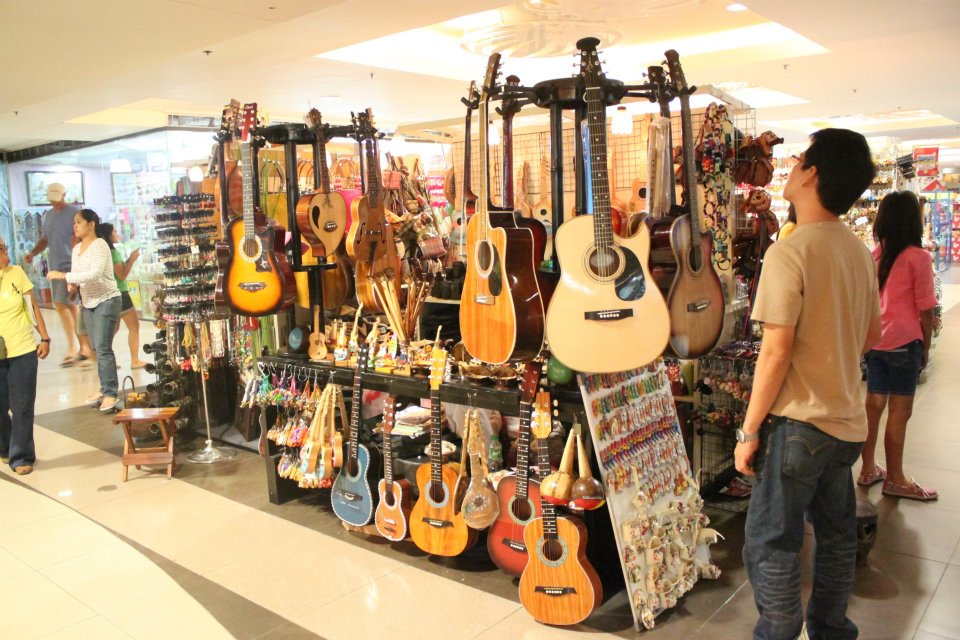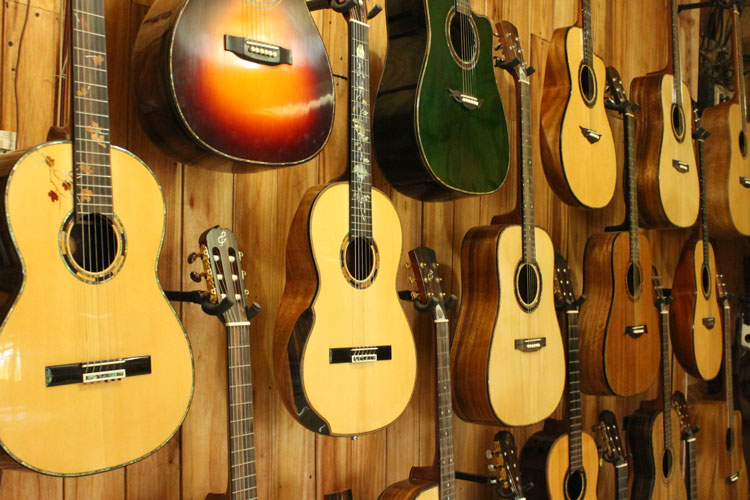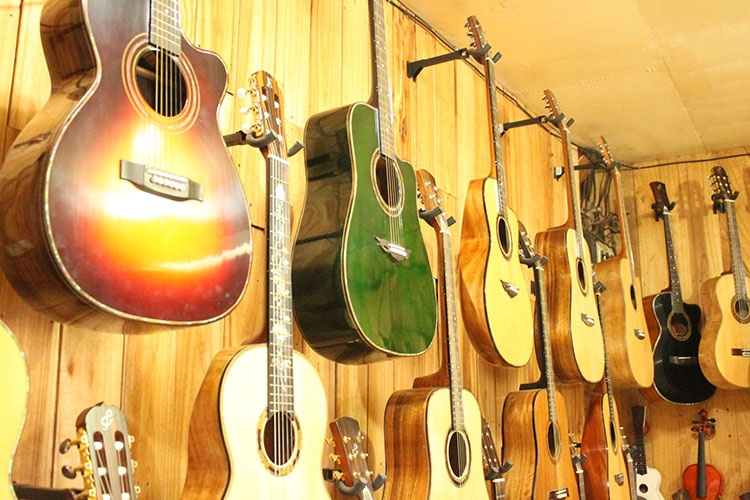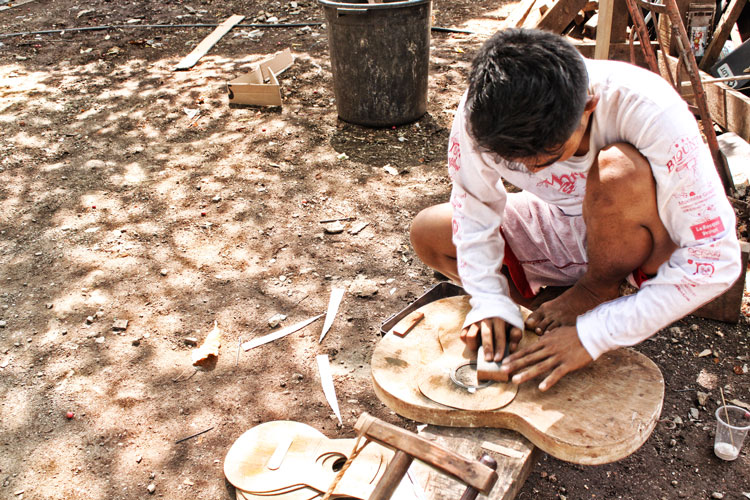
June 2012 SM City Cebu Exhibit

Hungry for updates about Ferangeli Guitar Handcrafter? Come here and blog with us. Catch updates on new products, events and where we will be exhibiting our products next!


Sunday, October 18, 2009
Cris Evert Lato Sun.Star Cebu
WHILE waiting for the economy to recover, Fernando Dagoc, owner of Ferangeli Guitar Handicrafts said he keeps himself busy in drying wood so they can proceed with the production of guitars as soon as orders start coming in again.
“This business is our family’s source of income so I need to find ways for the business to stay in the market,” Dagoc said. He recalled that when the global economic slowdown started, there was a 30 percent decline in sales. “My guitar business wasn’t spared,” he said.
Because of the sales decline, Dagoc said he shortened the workweek of his contractual employees from six working days to just three. “There is no way for us to produce more because we have enough stocks of our guitars,” he said.
Considered as the third generation of a family of guitar makers, Ferangeli Guitar Handicrafts produces high quality handmade guitars in Lapu-Lapu City.
It has been selling to foreign markets such as Canada, Spain, US, California and Hawaii.
“Some of these buyers, Canada in particular, send their materials here and we just assemble it and send it back to them,” he said. “Foreign buyers love to have their guitars made in Cebu because they are assured of the quality.”
Aside from the foreign market, Dagoc said they have penetrated the local market in some parts of the Visayas and Mindanao. Prices of the guitars range from P800 for low-end pieces to P45,000 for high-end models.
“If some businesses see the global economic crisis as a downfall, I see it as an opportunity to re-establish the business,” Dagoc said. “You have to be resilient.”
He said that they joined exhibits to gain more exposure and to attract more buyers.
Ferangeli Guitar Handicrafts was chosen as one of the representatives of DTI’s project One Town-One Product program. Aside from guitars, they also produce souvenir items such as key chains made out of scrap materials from guitar-making.

Cris Evert Lato Cebu Daily News
First Posted 14:27:00 12/22/2008
Filed Under: Entrepreneurship, Economy and Business and Finance
CEBU CITY, Philippines – The busy world of downtown Cebu was a normal sight for Fernando “Andoy” Dagoc in the 60s when he used to visit his late grandfather Pedro Abendan who ran a guitar shop on Manalili street.
At seven years old, the young Andoy was the loyal assistant of La Filipina Guitar. The store was established in 1919 and located in the old Lincoln District, downtown Cebu City.
His parents, Nelita and Primitivo, also put up their own guitar business, Custom Guitar in 1960. The store was still located on Manalili street.
As the eldest among four children, Dagoc helped manage the store. This was where his interest for guitar-making became his passion.
“Didto ko nakat-on unsaon pagdala og tawo, nga importante gyud ang tawo. Daghan kog nakat-unan didto nga wala sa libro (That is where I learned how to handle people… that taking care of your people is important. I learned a lot there that were not found in books),” he told Cebu Daily News.
His extensive exposure made him decide to take over the family business, as a third generation entrepreneur. This was after he finished his degree in mechanical engineering at the University of San Jose-Recoletos.
He opened Ferangeli Guitar Handcrafter in 1988 with only P2,000 in capital in 1988. The store was named after their first born. It is also a combination of his name, Fernando and his wife, Angelita.
From Cebu City, he moved his store to Barangay (village) Pajac, Lapu-Lapu City, which has been the production site of the family’s guitar business.
Although Ferangeli was not the first guitar store in Lapu-Lapu when they moved in, the brand still became widely popular.
“I do research. I always seek for ways on how I can stay ahead of my competitors like what needs to be done and what needs to be improved on,” Dagoc said.
He first hired one person to do the guitar prototypes with him. Dagoc said he was careful because it was his first shot to build a name of his own.
In 1994, he decided to focus his efforts and time in opening a lumber business because he thought it would be more profitable. His guitar business was done on the side.
“I supplied wood to other guitar store owners, furniture companies, handicrafts. Twice, I went bankrupt but I did not stop. I borrowed money and paid my dues diligently,” he said in Cebuano.
When he observed that interest in Cebu-made guitars achieved unparalleled growth in the late 90s, Dagoc intensified his guitar production.
Because of his unique designs and attention to details, his guitars made a big hit in the local market. He supplied guitars to malls and major souvenir stores in Cebu and in other parts of the country.
While his lumber and guitar business maintained a steady growth, Dagoc then saw another opportunity to diversify his business. He opened handicraft shop in 2000.
“It was my handicraft products which were exported before the guitars. I decided to venture into handicrafts so there will be a variety. In case guitars will not sell well, at least, I have an alternative.”
As his handcrafted products made waves in the United States and in other parts of the world, Ferangeli guitars also carved its own international name in 2005.
His first international client was a guitar virtuoso and professor from Spain, who randomly visited guitar stores in Lapu-Lapu City.
The same client is also one of his loyal “consultants,” who give him guitar books to serve as reference materials.
From there, export orders from Norway, Hawaii and Canada, among others, continue to pour in up to this date.
Dagoc said he learned to play in all market levels to battle fierce competition. This is also his formula for success in battling the economic crisis.
“Ang tawo mangita gyud na og ubos-ubos nga presyo pero maayo og quality. Naa mi ingon ana nga produkto diri (People will always look for affordable but good products. We sell these products),” he said.
Low-end guitars are sold at P600 each, while high-end and export quality guitars are sold at P40,000 each. Mid-end guitars, usually made of jackfruit wood, cost P3,000 per piece.
High-end guitars are mostly made of imported wood such as Canadian spruce top and red and white cedar. He said local wood that can be used as premium guitars, include kamagong, banuyo and bayong.
While the Cebuano name is known worldwide to produce world-class products, Dagoc said businesses in Cebu should not be complacent.
“It’s best to research, innovate and never rest on producing good products. Things change, so you have to adopt. Never think that things will stay as they are.”
“It is also important not to lose hope on the business and your people. Trust your people. Make sure that you pay them well,” he said.
Source: Cebu Daily News

First Posted 14:33:00 03/04/2008
Filed Under: Economy, Business & Finance
Cris Evert Lato Cebu Daily News
LAPU-LAPU CITY, Philippines ? Highly skilled workers are needed in the making of guitars in Lapu-Lapu City to meet the demand from the tourism and export sectors.
Fernando Dagoc, owner of Ferangeli Guitar Handcrafter, said the company needs at least six months before it can deliver the products needed by clients.
The company exports guitars and ukeleles to Canada, Spain and Hawaii.
Most skills in guitar-making are passed on from one generation to the next. Dagoc is a third generation guitar maker.
Local guitar production is a crude process which starts from cooking the wood manually to remove the resin, which will cause the wood to crack immediately.
Weather temperature is also noted to ensure that guitars are in good condition when they reach their destination.
The company only has 22 workers.
Lack of skilled workers is the reason it takes at least 45 days to finish one high-end guitar, which is priced between P6,500 to P30,000.
Only 12 guitars can be finished in six months.
The company also exports guitar parts to other manufacturers in Lapu-Lapu City and in other countries.
At present, 40 pieces of customized fret boards are ordered by a Canadian company. Each fret board piece costs P3, 000.
Fernando Alegre, proprietor of Alegre Guitars, said his company only has three highly skilled workers who can assemble all guitar parts.
Around six are only helpers. To cope with the lack of workers, Alegre said he sub-contracts to neighbors.
Alegre, who is a third generation guitar maker, said it is hard to look for guitar makers since the work involves learning the craft since childhood.
?My father learned guitar making when he was six years old because they were exposed to the work by their parents,? he said.
The lack of highly skilled workers is also the main reason why the company does not export guitars.
He said the quality of their guitars will be affected if they choose to increase production due to export demand.
Instead, they cater to tourists who come to Lapu-Lapu City to buy guitars.
One worker can finished four low-end guitars in one week, but one worker can only finished one high-end guitar in two months.
The quality of the guitar depends on the wood used for its sound board and fret boards, among others.
Internationally-accepted wood materials are spruce and cedar. In the Philippines, jackfruit, acacia and mango wood are often used as alternative materials.
For Alegre Guitars, one high-end guitar costs between P50,000 to P80,000.
Although his company is not affected by the proliferation of cheap guitars, he noted that companies who produce low-end guitars may be greatly affected by the products coming from China.
Source: Cebu Daily News